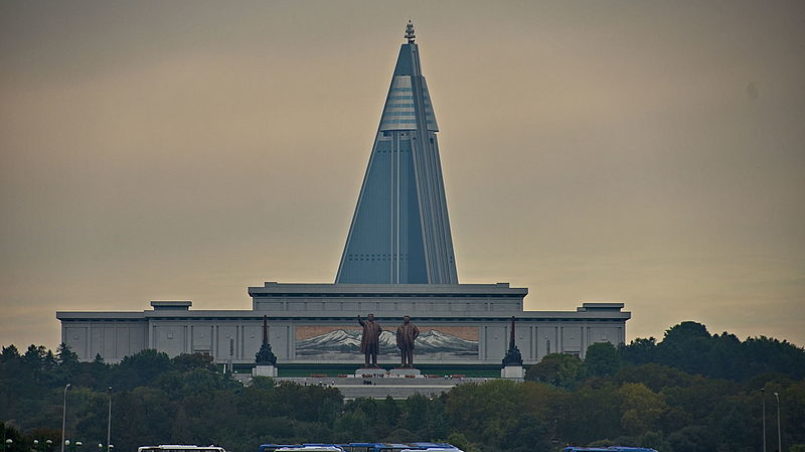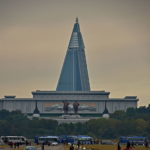Quo vadis, North Korea?

North Korea is one of the countries most frequently mentioned in the news. Nevertheless, the knowledge of an average citizen of this East Asian state is limited to the abridged public representation. Perhaps this is why the Austrian Institute for European and Security Policy (AIES) and the Diplomatic Academy invited Professor Rüdiger Frank – one of the most distinguished experts on this subject – to a lecture at the beginning of January 2018.
Rüdiger Frank, born in the GDR, is a scientist who studied Korean Studies and who regularly travels to North Korea. He is a member of the World Economic Forum and teaches in Vienna, the USA, and South Korea.
The two main problems facing the West through North Korea are, on the one hand, the nuclear missiles that would threaten regional security and, if passed on to terrorists, potentially the rest of the world. On the other hand, human rights’ violations: no independent judiciary, no free elections, no civil rights and no personal freedoms for people.
So far, several attempts have been made to put a stop to the problem of North Korea: pressurise the leadership to change its attitude. Sanctions which, however, would only have an impact on the ordinary population (by harming local trade and small businesses), but not on the government team. Furthermore, food sanctions are difficult to reconcile with the popularly propagated western values. The information campaigns for the North Korean population via radio and TV broadcasts from South Korea have also had a relatively little impact. Hoping that the problem will solve itself has also, however, turned out to be an ineffective strategy.
Why have these measures not been successful? Apart from the verifiable fact that sanctions are hardly effective (historically, there has been only one single case of success: in South Africa), the strong Korean nationalism should not be forgotten: contrary to some Western propaganda, hardly anyone in North Korea is waiting for “liberation” – on the contrary, the masses of people stand behind the leadership and even support the nuclear weapons program. This is partly due to the gradual improvement of the economy: three to four million people can now be regarded as belonging to the middle class.
Due to the political isolation of recent decades, North Korea has achieved a high degree of economic self-sufficiency from the rest of the world – and neither sanctions nor financial measures would work. The hunger situation, which is often mentioned in the western media, is exaggerated: calories are no longer the problem, but rather the quality of food.
Due to the rise of the middle class, money has become an important factor: according to Frank, almost all goods can be bought and the supermarkets in the larger cities are well stocked – albeit at high prices, making them unaffordable for the majority of the population. Discounts are already being offered, for example, on public holidays; this is a “capitalist measure”, which would have been unthinkable ten years ago. Several credit card companies compete for customers. Mobile phones and tablet PCs, the quality of which match western products at least in terms of software, are produced locally. In the capital, Pyongyang, six taxi companies compete with each other, also unusual for a socialist planned economy. Economic change can also be recognised in the skyline of the capital city.
In principle, the Professor sees hardly any efforts by countries to change North Korea. If this were the goal, positive trends, for example, economic development and numerous small businesses, would have to be supported as was the case with China and Eastern Europe. The sanctions, however, produce exactly the opposite.
Of course, the situation in North Korea is not rosy: surveillance, above all by technical means, has increased sharply. There is still far too little electricity, as current satellite images of the Korean peninsula strikingly show. Human rights are not being respected. The autocratic leadership does not allow any opposition.
Nevertheless, the changes mentioned above cannot be dismissed. In 2013, the country’s leadership presented a new strategy: whereas the focus of the old doctrine was solely on the military, economic development has now assumed an equally important role. Another reason to encourage them, by investing in the 23 Special Economic Zones is that, with a few exceptions, this has not yet happened. The fear of the West, however, is not unfounded: the dollars earned there could flow directly into the country’s military program. Due to the (at least) ten years of military service, the army is strongly anchored in the population and – despite various repressive actions – is not perceived by the population as an enemy, but rather as a protector against the foreign threat.
Since, according to Frank, both sides lie a great deal and the sanctions would not leave much room for diplomatic negotiations, it would only be possible to influence Washington in order to defuse the situation in the long term. In the short term, only Kim Jong Un and Donald Trump will be able to make a difference. Frank does not consider bringing the Iran deal into play as a possible model for an agreement with North Korea as particularly expedient: firstly, people know about Trump’s attitude towards it, and secondly, North Korea is not in a comparable situation and, thirdly, Iran is much more economically dependent on access to the world market than North Korea currently is.
In conclusion, Frank posed three key questions for the evaluation of a future solution as regards North Korea: How stable is the North Korean system really? Where does all the money that has been used to finance the country for decades despite sanctions come from? And – presumably associated with this – is China part of the solution or part of the problem?
Credits
| Image | Title | Author | License |
|---|---|---|---|
 |
Northkorea_header | uwebrodrecht | CC BY SA 2.0 |
